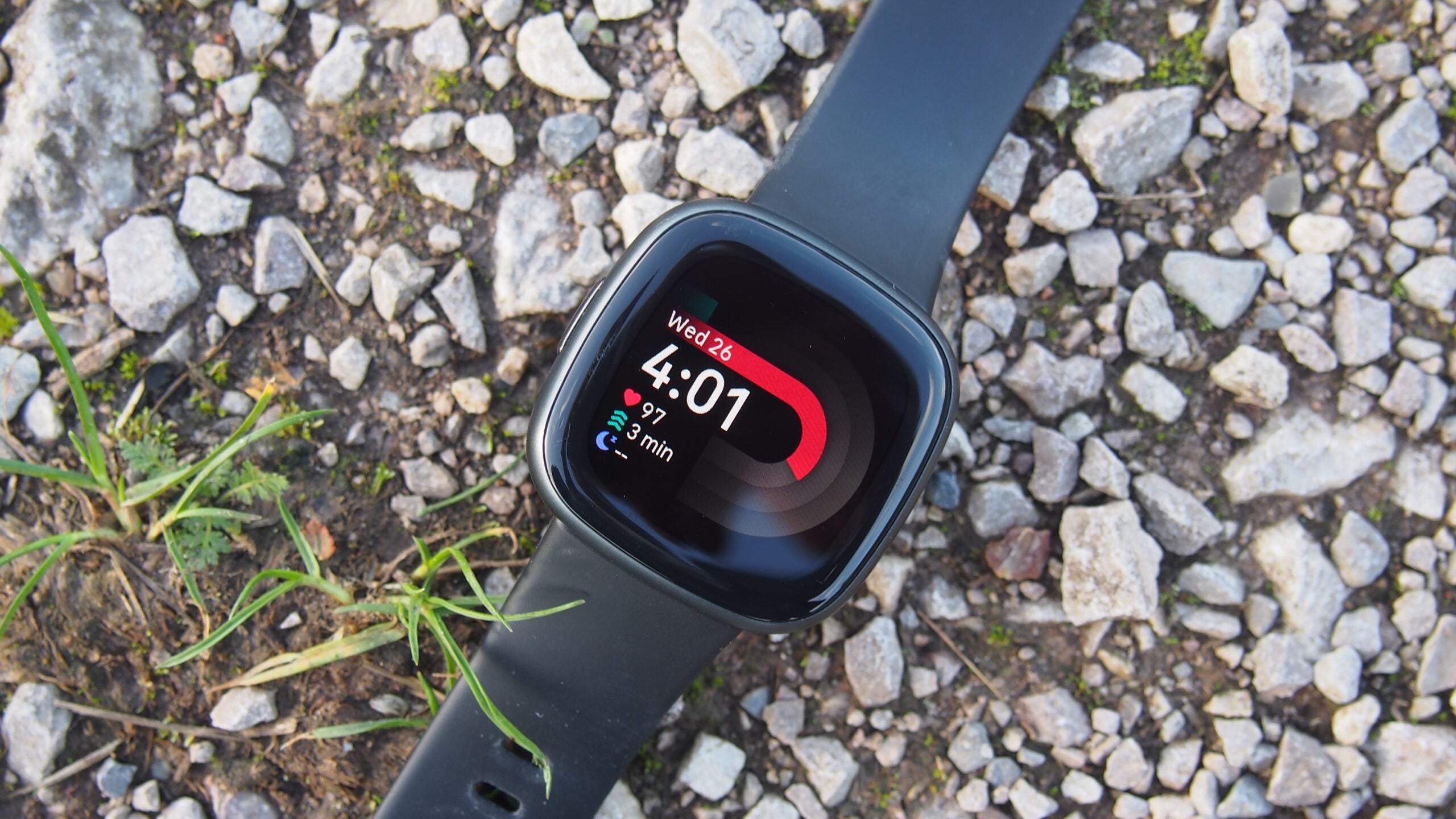If you have your sights set on changing up your fitness goals with a new Fitbit to guide you then these are our top picks.
Fitbit is in a weird state of flux at the moment. For the longest time, we’ve heralded Fitbit’s wearables as great options for people taking their first steps in the world of health and fitness thanks to their easy to understand UI, approachable app and longevity on a single charge. Unfortunately, since Fitbit was bought up by Google, the company has seen something of a downward spiral as its products are no longer as capable as they once were.
For example, offline music support is no longer available for the Fitbit Versa and Sense wearables, which is huge letdown for anyone who likes to leave their phone at home during a run and simply tap into their favourite playlists directly from their wrist.
On a similar note, some of Fitbit’s social features like Fitbit challenges, adventures and open groups have bit the dust which, as you can imagine, isn’t going down all too well with the existing fan base.
All of this leaves Fitbit’s devices in a tricky situation. At their core, they’re still excellent products that can offer up plenty of information to help the progress towards a healthier lifestyle, and they’re significantly cheaper than alternatives from the likes of Samsung, Apple and even Google itself. The problem is that there’s no telling what else Google might change about the existing infrastructure.
Our recommendation for now is to keep these caveats in mind if you do decide to shop around for a Fitbit, but if you’ve decided that you want to see what else is out there then you can also check out our round-ups for the best running watches and best smartwatches.
Best Fitbit at a glance
How we test
We use every Fitbit we review as our primary wearable for at least a week – or longer, if the battery life lasts beyond that point or we need more time to trial its features.
During that time we will test it on a variety of different activities. These will range from basic step tracking, to how well it tracks runs, swims, cycling and more.
For distance tracking, we assess how accurately the device records runs on tracks we know the length of. We also evaluate the level of battery life lost per hour using features such as built-in or connected GPS. To check heart rate accuracy, we compare the results from the wearable to a dedicated HRM strap.
Next we combine the data recorded with our general experience of using the wearable day-to-day, revealing whether the device proved comfortable to wear, alongside any issues we may have encountered with unexpected bugs over the review period.
We then evaluate key metrics including app support, usability and battery life.
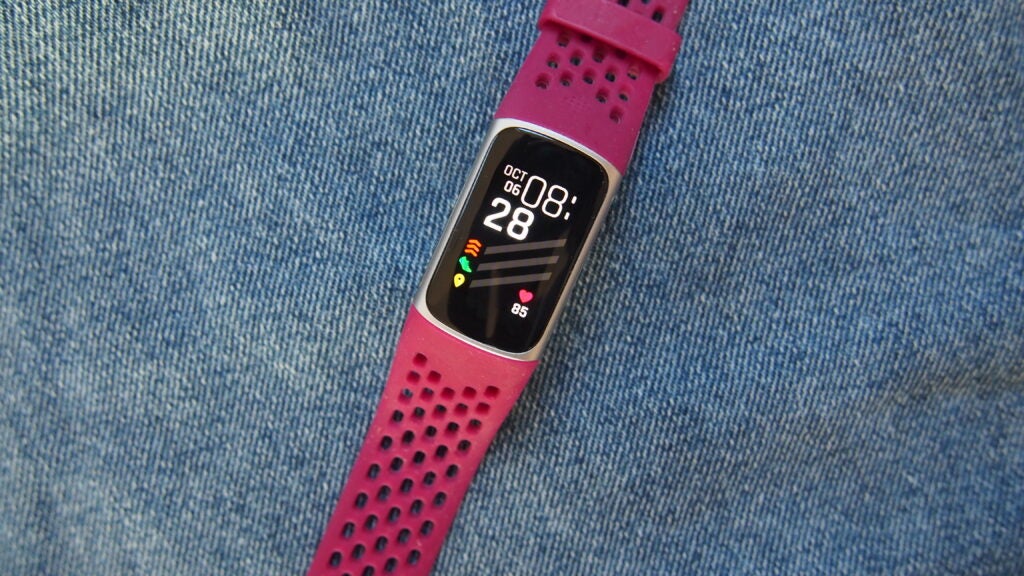
Fitbit Charge 5
The Best Fitbit fitness tracker
Pros
- Vibrant colour display
- Comfortable strap
- Added ECG sensor
Cons
- Screen responsiveness a little temperamental
- GPS accuracy not great
The Fitbit Charge 5 is a great visual improvement over its predecessor thanks to its bright and detailed AMOLED screen, which adds a great deal of life and vibrancy to this handy wearable. It’s also an ergonomic success too, with a very comfortable and secure strap and an aluminium casing which is more appealing than the resin of the previous generation. This unit is waterproof up to 50 metres, so you can safely take it for a dip as well.
The tracking is particularly good when it comes to counting your steps or monitoring your sleep, which is accurate and gives you the data you need to keep a better eye on your health. The heart-rate sensor is also very accurate, but the on-board GPS was a little more wobbly and took a long time to lock on to your location. The generous battery life is also likely to give you a week’s worth of use before you need to charge it back up again.
Full Review: Fitbit Charge 5
Reviewer: Michael Sawh
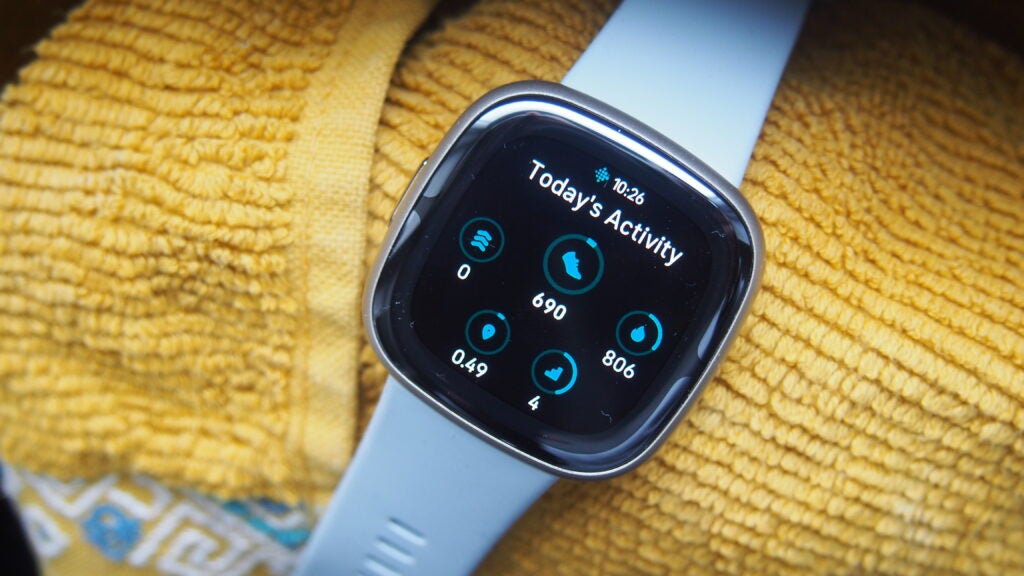
Fitbit Sense 2
The best Fitbit smartwatch
Pros
- Physical button is back
- Reliable resting heartrate data
- Strong sleep tracking features
Cons
- Sluggish software
- Missing smartwatch features
- Some new features not available yet
The Fitbit Sense 2 is an all-round smartwatch that has a bit more functionality than a basic fitness tracker. It’s got a thin and light build, an appealing colourful AMOLED touchscreen display, and a physical button on the side.
However, it has to be said that the smartwatch experience here isn’t as well-executed as other brands’ offerings, because the support for certain key apps is lacking (at least at launch, when even the likes of Google Maps and Google Wallet were unsupported), and the performance is a bit laggy too due to an underpowered chipset.
However, the fitness and health features – including in-built GPS, ECG and skin temperature sensors, and blood oxygen tracking – all combine to help give you a strong picture of your overall wellbeing. The watch makes it easy to keep tabs on your sleep and on your stress levels, but if you want to get a deeper look into your athletic training then this one isn’t the strongest.
We found that the Sense 2 could hold up for around six days before needing a charge, though that’s reduced to 3 days if you keep the watch in always-on mode.
Full Review: Fitbit Sense 2
Reviewer: Michael Sawh
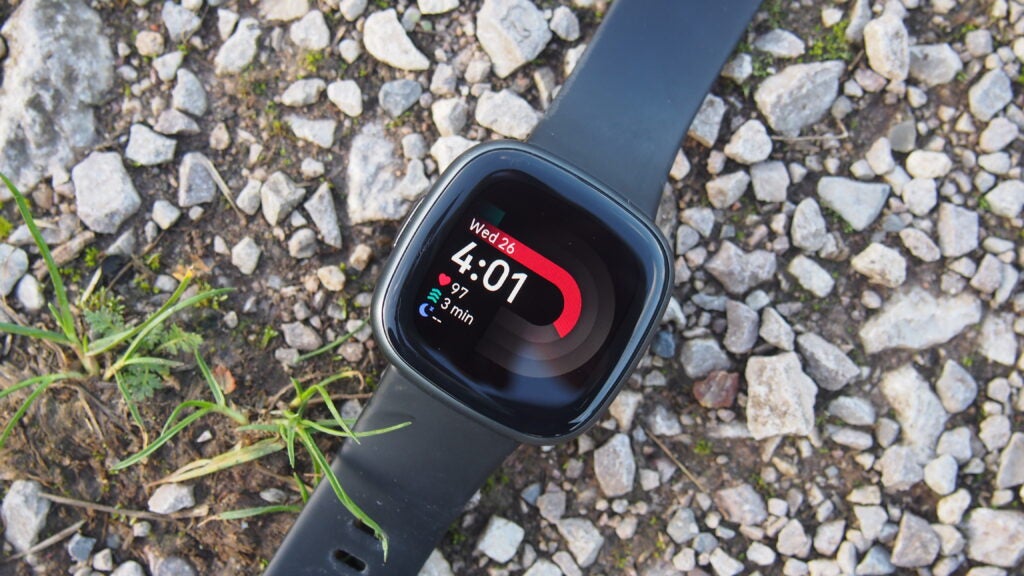
Fitbit Versa 4
The best affordable Fitbit smartwatch
Pros
- Reliable sleep tracker
- Physical button returns
- Smooth UI
Cons
- Third party app support is gone
- Resting and exercise heart rate accuracy
- Stress features a work in progress
The Fitbit Versa 4 is the latest device in Fitbit’s Vera line-up, but we actually preferred its predecessor and that’s the one we’d choose out of the two. Why? Well because the feature list is more or less the same as this one, and actually some have been lost; the newer watch doesn’t have Wi-Fi connectivity or a music player, both of which are present here.
For the price this watch delivers plenty of features and is therefore a tempting proposition, though features such as the GPS and the heart-rate tracking are not highly accurate and even the step counter can be a bit over-generous.
However, if you’d like a Fitbit with some smarter features, and want to save a bit of money, then this is a decent option.
Full Review: Fitbit Versa 3
Reviewer: Thomas Deehan
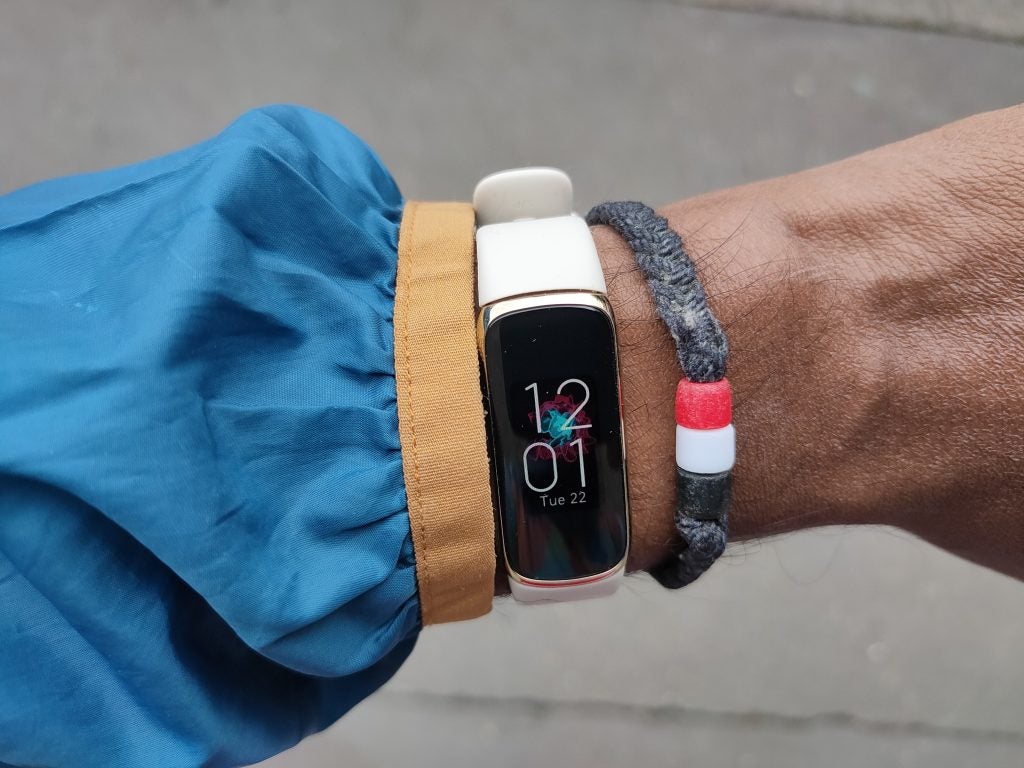
Fitbit Luxe
The best-looking Fitbit
Pros
- Decent-quality AMOLED screen
- Good for resting heart rate monitoring
- Nice straps available
- Works well for sleep tracking
Cons
- Notifications feel cramped
- Connected GPS support isn’t always reliable
- Features hidden behind Premium subscription
- No payment support
Slim and attractive, the Fitbit Luxe is light to wear and has a selection of appealing metallic cases, and equally appealing watch bands, that make it a tab more fashionable to wear compared to standard fitness tracker and smartwatches. The screen is also sharp and bright, and it’s purely touchscreen without any input buttons.
In terms of health monitoring, this watch will gives reliable continuous heart rate sensing and comfortable and accurate sleep tracking too. There aren’t tonnes of additional exercise-tracking options here, but this is a handy little tool for keeping an eye on your day-to-day health and wellness.
You’ll get around five days’ battery life from this wearable before you need to charge it back up, which isn’t brilliant, and it’s fairly slow at recharging too as it takes two hours to go from 0-100%.
This tracker isn’t right for you if you want intensive exercise logging or a host of smart features on your wrist, but it’s still a handsome and helpful little accessory.
Full Review: Fitbit Luxe
Reviewer: Michael Sawh
Google Pixel Watch
The best Fitbit that’s not a Fitbit
Pros
- Cleaner feeling version of Wear OS
- Crisp display
- Fitbit added into the mix
Cons
- Battery drain
- Awkward to change straps
- Sub-par sports tracking
The Google Pixel Watch might not be branded as a Fitbit on the box, but to all intents and purposes that’s exactly what it is; Fitbit fitness tracking is well-integrated on this watch, so if that’s a major selling point for you then you’ll be relieved to see the familiar interfaces on this product too.
Google’s first-ever own-brand smartwatch is sleek and elegant, and it’s also remarkably small too with just a 41mm casing. There’s a crown and a side button to complement the touchscreen, which is a rich AMOLED panel that’s bright and brilliant despite the bezel running around the edge.
There’s very little lag on this watch when you’re zipping around the interface, though there are occasionally long loading times, and the Wear OS software feels particularly clean and pure. Part of the appeal lies in the close collaboration with Fitbit, which is responsible for step counts, sleep tracking, and exercise tracking. There are handy ECG and blood oxygen sensors here too.
We found that health metrics such as heart rate and sleep were reliable, but it was a different story when it came to exercise tracking, as the on-board GPS was fairly inaccurate, and the swimming tracking was so dreadful as to be useless. Another bad miss was the battery life, which is far shorter than other Fitbits; it will get you through the day, as long as you don’t use the GPS too much, but that’s it.
Full Review: Google Pixel Watch
Reviewer: Michael Sawh
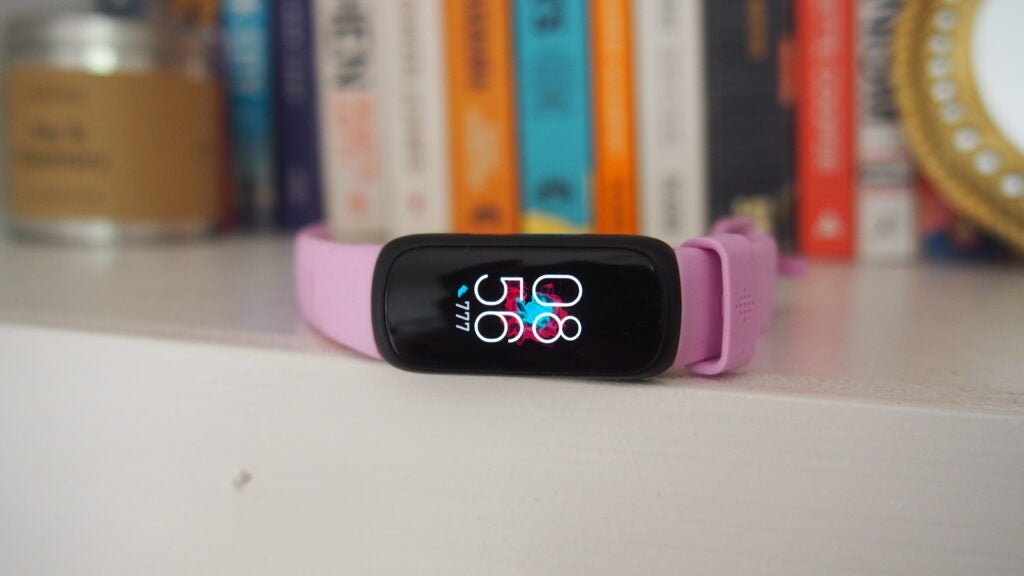
Fitbit Inspire 3
Best Fitbit for beginners
Pros
- Now has a colour screen
- Slim design is great for 24/7 wear
- Sttrong feature set for the price
Cons
- Colour screen could be bigger
- Reading notifications can feel cramped
- Fitbit Premium needed some insights
The Fitbit Inspire 3 is a polished wearable that is our top pick for anyone that’s new to the world of fitness trackers and would like a gentle introduction. It improved on its predecessor by including a new colour touchscreen, and the slim form factor makes it feel a lot more premium.
There are limited smartwatch features on the Inspire 3, with no payment support, smart assistant or apps. However, it does manage to pack in a fair amount on the fitness and health tracking front, offering up automatic sleep monitoring, an optical heart rate sensor and infrared sensors to measure blood oxygen.
We also thought that the Inspire 3 shined when it came to the basics; daily step counts were in line with other tracking platforms we used and the reminders to hit your hourly step goals ensure that you’re regularly moving throughout the day.
With up to 10 days of battery life and reliable fitness tracking, the Inspire 3 is the best pick for anyone new to the wearable world. We thought that it offered much better value for money than previous Inspire entries, and could be the standout new wearable from Fitbit in 2023.
Full Review: Fitbit Inspire 3
Reviewer: Michael Sawh


